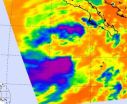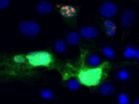Vitamin D supplements do not improve cholesterol as previous research suggested
2012-09-05
(Press-News.org) Vitamin D has been touted for its beneficial effects on a range of human systems, from enhancing bone health to reducing the risk of developing certain cancers. But it does not improve cholesterol levels, according to a new study conducted at The Rockefeller University Hospital. A team of scientists has shown that, at least in the short term, cholesterol levels did not improve when volunteers with vitamin D deficiency received mega-doses of vitamin D. The finding is published in the journal Arteriosclerosis, Thrombosis and Vascular Biology.
The researchers, led by Manish Ponda, an assistant professor of clinical investigation in Jan Breslow's Laboratory of Biochemical Genetics and Metabolism, studied 151 people with vitamin D deficiency. The study participants were given either 50,000 internationals units of vitamin D3 or a placebo weekly for eight weeks. Participants' cholesterol levels were measured before and after treatment.
Correcting vitamin D deficiencies with high doses of oral vitamin D supplements did not change cholesterol levels, Ponda and his colleagues found, despite effectively increasing vitamin D to recommended levels. Vitamin D levels nearly tripled in the group that received supplements, but were unchanged in the placebo group.
"Our study challenges the notion that replenishing vitamin D improves cholesterol," says Ponda. "In fact, a biologic response to vitamin D was correlated with an increase in LDL cholesterol."
Ponda and his colleagues also tested the effect of vitamin D supplementation on lipoprotein particle size and number, biomarkers of cholesterol not typically measured in clinical practice, and found no change in response to increases in vitamin D.
These clinical trial results confirm those from a recent data mining study, published in July in the journal Circulation, conducted by the Breslow lab in collaboration with scientists at Quest Diagnostics. In that study, the researchers examined a de-identified dataset for 8,592 patients and showed that raising vitamin D levels from deficient to optimal levels had no statistically significant effect on LDL (bad) cholesterol, or triglycerides. Increasing vitamin D had a small, but clinically minimal impact on total and HDL (good) cholesterol. Both studies were supported by a Clinical and Translational Science Award from the National Center for Advancing Translational Science.
"This study raises questions about the use of vitamin D supplements to improve cholesterol," Ponda says. "Longer-term studies on the impact of vitamin D supplementation are needed to make stronger recommendations."
INFORMATION: END
ELSE PRESS RELEASES FROM THIS DATE:
2012-09-05
BEER-SHEVA, ISRAEL, September 4, 2012 -- Ben-Gurion University of the Negev (BGU) researchers have determined that preeclampsia is a significant risk factor for long-term health issues, such as chronic hypertension and hospitalizations later in life. The findings from the retrospective cohort study were just published in the Journal of Maternal-Fetal and Neonatal Medicine.
Thousands of women and their babies die or get very sick from preeclampsia; it affects approximately 5 to 8 percent of all pregnancies. It is a rapidly progressive condition characterized by high blood ...
2012-09-05
HOUSTON – Biologic therapies developed in the last decade for rheumatoid arthritis are not associated with an increased risk of cancer when compared with traditional treatments for the condition, according to new research from The University of Texas MD Anderson Cancer Center.
The study, published in The Journal of the American Medical Association (JAMA), is the largest systematic review evaluating the risk of developing any malignancy among rheumatoid arthritis patients using approved biologic response modifiers (BRMs), several of which include tumor necrosis factor ...
2012-09-05
(Edmonton) University of Alberta led research shows an elk's personality type is a big factor in whether or not it survives the hunting season.
Data collected from GPS collars on more than 100 male and female elk in southwestern Alberta showed U of A researchers the study population could be divided into two categories: bold runners and shy hiders:
Bold-runner elk, both males and females, moved quickly through the study area and preferred to graze in open fields for the most abundant and nutritious grass. GPS data showed shy hiders stayed and grazed on the sparse vegetation ...
2012-09-05
The protection of the savings of the elderly—one of the primary goals of Medicare—is under threat from a combination of spiraling healthcare costs and increased longevity. As the government attempts to reduce Medicare costs, one suggestion is that the elderly could pay a larger proportion of the costs of their healthcare. But exactly how much would this be and what impact would it have on their finances? A new study by Amy Kelley at the Mount Sinai School of Medicine and her colleagues, funded by the National Institute on Aging, aims to identify the portion of wealth ...
2012-09-05
Tropical Storm John had about one day of fame in the Eastern Pacific. Born Tropical Depression 10, it intensified into Tropical Storm John on Sept. 2 at 5 a.m. EDT and maintained maximum sustained winds of 40 mph (65 kmh) until it weakened back into a depression on Monday, Sept. 3 at 11 p.m. EDT.
NASA's Aqua satellite flew over John on Sept. 3 at 2041 UTC (4:41 p.m. EDT) during its brief time as a tropical storm and noticed convection (rising air that forms thunderstorms that make up the storm) and coldest cloud top temperatures seemed to be limited to the northeastern ...
2012-09-05
Over the weekend of Aug. 31 to Sept. 2, Tropical Storm Leslie's maximum sustained winds were pretty constant and satellite imagery from NASA's Aqua and Terra satellites confirm the steadiness of the storm. That story is expected to change later this week however, as Leslie nears Bermuda and is expected to reach hurricane strength. Meanwhile, Leslie is still about the same strength today, Sept. 4 because of wind shear.
Two visible images from the Moderate Resolution Imaging Spectroradiometer or MODIS instrument that flies onboard both of NASA's Aqua and Terra satellites ...
2012-09-05
Tiny Tropical Storm Michael formed today, Sept. 4, from the thirteenth tropical depression in the Atlantic Ocean, but it seems that wind shear will make Michael struggle to intensify over the next couple of days like his "sister" Tropical Storm Leslie. Isaac's remnants blanket the U.S. east coast.
Leslie has been a tropical storm since late Aug. and has not yet reached hurricane strength because of wind shear, although that is expected to change. Isaac's remnants are also struggling, but struggling to get off the land and back into the Atlantic Ocean. Isaac's remnants ...
2012-09-05
JUPITER, FL - Scientists on the Florida campus of The Scripps Research Institute have designed a compound that shows promise as a potential therapy for one of the diseases closely linked to fragile X syndrome, a genetic condition that causes mental retardation, infertility, and memory impairment, and is the only known single-gene cause of autism.
The study, published online ahead of print in the journal ACS Chemical Biology September 4, 2012, focuses on tremor ataxia syndrome, which usually affects men over the age of 50 and results in Parkinson's like-symptoms—trembling, ...
2012-09-05
COLUMBUS, Ohio – New research suggests that violent video games may not make players more aggressive – if they play cooperatively with other people.
In two studies, researchers found that college students who teamed up to play violent video games later showed more cooperative behavior, and sometimes less signs of aggression, than students who played the games competitively.
The results suggest that it is too simplistic to say violent video games are always bad for players, said David Ewoldsen, co-author of the studies and professor of communication at Ohio State University.
"Clearly, ...
2012-09-05
There isn't a hard and fast rule for how long doctors should perform CPR, but new research from the University of Michigan Health System shows longer attempts might be beneficial for some patients.
Most cardiac arrest patients are often successfully resuscitated after a short period of time – about 12 minutes on average. Practitioners are often reluctant to perform longer attempts – those that can last 30 minutes or longer – because if patients do not survive early on during cardiac arrest, their overall prognosis is poor.
The research from U-M, however, shows that ...
LAST 30 PRESS RELEASES:
[Press-News.org] Vitamin D supplements do not improve cholesterol as previous research suggested



